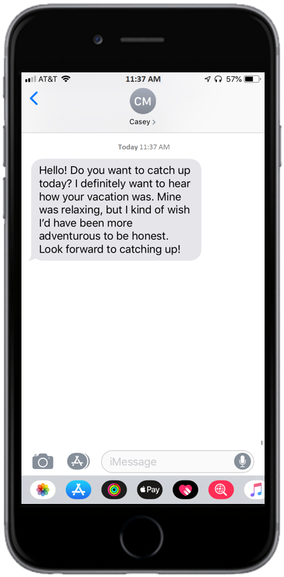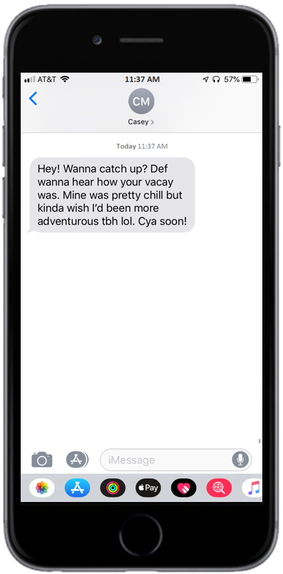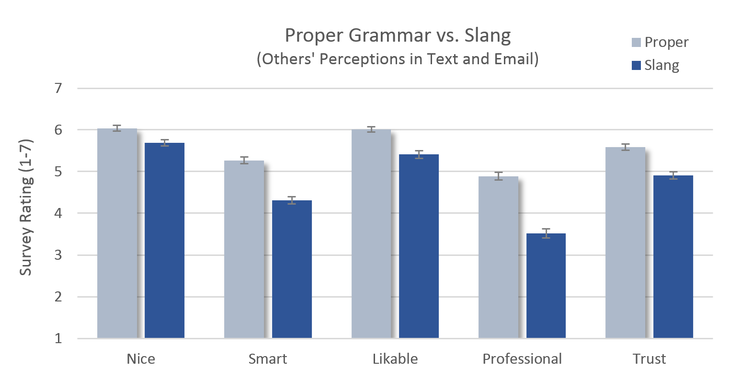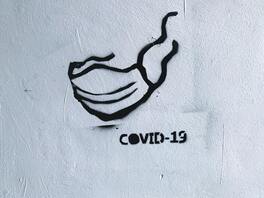Overview
Language is both art and science. The words we use to communicate information and emotions are constantly evolving. This is true even today. Our new era of computers, smartphones, and the internet has ushered in a host of new acronyms and abbreviations that not only save us time typing, but also provide new ways of conveying information and emotions while socially connecting with peers that know the lingo.
To put it bluntly, "it's lit fam."
But while some of us slay the lol's, others are shook. Not everyone's a fan of of this new-age slang. But haters gonna hate, right? It raises the question. Might using slang actually affect how others perceive us? In other words, are we spitting straight fire? Or low key taking an L when we use the lol?
Well, we're here to spill the tea. We ran an experiment testing how slang affects others' perceptions of how nice, smart, likable, professional, and trustworthy we are, in both texts and emails. Keep reading. The results will keep you woke.
The Experiment
We had 400 people from Amazon MTurk participate in a survey experiment, a vignette scenario involving an email or text message from a hypothetical friend at work, Casey, that either used slang or didn't. We randomized whether participants saw the email vs. text message, as well as whether they read the slang vs. proper grammar wording.
After reading the message, participants rated a series of outcome measures on a 1-7 scale with the preceding question "To what extent do you think each of the following words describe Casey? (1 = Not at all; 7 = Extremely)." The five outcomes (words) included:
* Smart
* Nice
* Likable
* Professional
* Trustworthy
The text messages that participants read is as follows. Emails contained the same words, just in email format.
Language is both art and science. The words we use to communicate information and emotions are constantly evolving. This is true even today. Our new era of computers, smartphones, and the internet has ushered in a host of new acronyms and abbreviations that not only save us time typing, but also provide new ways of conveying information and emotions while socially connecting with peers that know the lingo.
To put it bluntly, "it's lit fam."
But while some of us slay the lol's, others are shook. Not everyone's a fan of of this new-age slang. But haters gonna hate, right? It raises the question. Might using slang actually affect how others perceive us? In other words, are we spitting straight fire? Or low key taking an L when we use the lol?
Well, we're here to spill the tea. We ran an experiment testing how slang affects others' perceptions of how nice, smart, likable, professional, and trustworthy we are, in both texts and emails. Keep reading. The results will keep you woke.
The Experiment
We had 400 people from Amazon MTurk participate in a survey experiment, a vignette scenario involving an email or text message from a hypothetical friend at work, Casey, that either used slang or didn't. We randomized whether participants saw the email vs. text message, as well as whether they read the slang vs. proper grammar wording.
After reading the message, participants rated a series of outcome measures on a 1-7 scale with the preceding question "To what extent do you think each of the following words describe Casey? (1 = Not at all; 7 = Extremely)." The five outcomes (words) included:
* Smart
* Nice
* Likable
* Professional
* Trustworthy
The text messages that participants read is as follows. Emails contained the same words, just in email format.
Results
We found that in both text and email, using slang negatively affected how others viewed our message writer. Using slang caused our respondents to view Casey as less nice by 5.8% (difference = -0.35; p = 0.001), much less smart by 18.2% (diff. = -0.96; p < 0.001), less likable by 10.0% (diff. = -0.61; p < 0.001), a lot less professional by 28.0% (diff. = -1.37; p < 0.001), and less trustworthy by 12.2% (diff. = -0.68; p < 0.001).
Message medium (email vs. text) actually didn’t matter too much. Although we suspected that readers may be more forgiving of slang in a text as opposed to an email, or perhaps even prefer it, we found no such interaction. There was, however, a small but surprising effect of text being viewed as more professional than email (diff. = 0.40; p = 0.011). No interactive effects were found for either slang or message medium with gender or age, even for younger generations like Millennials or Gen Z.
We found that in both text and email, using slang negatively affected how others viewed our message writer. Using slang caused our respondents to view Casey as less nice by 5.8% (difference = -0.35; p = 0.001), much less smart by 18.2% (diff. = -0.96; p < 0.001), less likable by 10.0% (diff. = -0.61; p < 0.001), a lot less professional by 28.0% (diff. = -1.37; p < 0.001), and less trustworthy by 12.2% (diff. = -0.68; p < 0.001).
Message medium (email vs. text) actually didn’t matter too much. Although we suspected that readers may be more forgiving of slang in a text as opposed to an email, or perhaps even prefer it, we found no such interaction. There was, however, a small but surprising effect of text being viewed as more professional than email (diff. = 0.40; p = 0.011). No interactive effects were found for either slang or message medium with gender or age, even for younger generations like Millennials or Gen Z.
Conclusion
Oof. I guess the world is still adjusting to our modern-age vernacular. On average, it seems that people are bit salty toward slang (i.e., not huge fans). If you're trying to look smart or professional especially, maybe consider erring on the side of formality in your communications.
Does this mean we shouldn't use slang? Of course not. Like art, language and its adaptations are not always appreciated until later. And even when they are, they may only become popular in select groups or eventually fall out of vogue. So enjoy your yeets, btws, and omgs. Just be cognizant of the context if you're trying to manage your image.
Oof. I guess the world is still adjusting to our modern-age vernacular. On average, it seems that people are bit salty toward slang (i.e., not huge fans). If you're trying to look smart or professional especially, maybe consider erring on the side of formality in your communications.
Does this mean we shouldn't use slang? Of course not. Like art, language and its adaptations are not always appreciated until later. And even when they are, they may only become popular in select groups or eventually fall out of vogue. So enjoy your yeets, btws, and omgs. Just be cognizant of the context if you're trying to manage your image.
Methods Note
We used ordinary least squares (OLS) regression analyses to test for significant differences in how nice, smart, likable, professional, and trustworthy our message sender was perceived to be between the slang and no-slang conditions. For significant differences, the difference between the two groups' averages would be large and its corresponding “p-value” would be small. If the p-value is less than 0.05, we consider the difference statistically significant, meaning we'd likely find a similar effect if we ran the study again with this population. To test whether differences for specific groups differ significantly from their counterparts (e.g., men vs. women) we used OLS regression analyses with interaction terms.
The survey materials and data for this experiment are available on our page on the Open Science Framework.
Methods Note
We used ordinary least squares (OLS) regression analyses to test for significant differences in how nice, smart, likable, professional, and trustworthy our message sender was perceived to be between the slang and no-slang conditions. For significant differences, the difference between the two groups' averages would be large and its corresponding “p-value” would be small. If the p-value is less than 0.05, we consider the difference statistically significant, meaning we'd likely find a similar effect if we ran the study again with this population. To test whether differences for specific groups differ significantly from their counterparts (e.g., men vs. women) we used OLS regression analyses with interaction terms.
The survey materials and data for this experiment are available on our page on the Open Science Framework.
Popular Experiments
COVID MasksDoes wearing a COVID mask affect how others think of you?
|
Video GamesAre video games more enjoyable than board games?
Does age or gender matter? |
Zero-Sum PoliticsDo Democrats or Republicans view society as win-lose?
|






